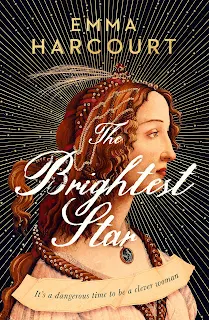* Copy courtesy of Harper Collins *
Set in Florence, The Brightest Star by Emma Harcourt starts in 1479 with the birth of Leonarda Lunetta (Luna) Fusili. Luna is born with a misshapen leg and is immediately rejected by her mother. The eldest daughter of Signore Vincenzio Fusili, Luna is brought up with reading, debate, science and astronomy, usually the preserve of male heirs.
Twenty odd years later and Luna's father is supporting the Medici family in secret after Piero di Lorenzo de’ Medici's banishment from the city. Renaissance Florence is beset by fundamentalist preacher Friar Girolamo Savonarola who reminded me a little of the High Sparrow in Game of Thrones. Luna finds herself taken in by him at one of his sermons:
"Luna heard tenderness in his entreaties to the congregation and there was a murmur of agreement from the floor. The people swayed and gasped as one as the preacher grew ever more impassioned. Luna swayed just as the strangers around her did, and there was a warm fealty in doing so." Page 127When piles of precious books are burned and neighbours thrown out into the street for heresy, a feeling of dread pervades the family. Luna has a passion for learning and longs to continue her studies but her step mother's insistence she be wed or attend a nunnery on account of her leg is thwarting her plans for the future. Luna has received an education usually reserved for boys and she fights the inequality between the sexes, her lack of agency and the ignominy of her disability. Luna is a terrific protagonist and I really felt for her as she strived for what she wanted and fiercely resisted having her future decided for her.
Despite the political tensions and the danger of incurring Savonarola's wrath, there are moments of light dialogue and sensational writing. I particularly liked this phrase:
"Now, wash your hands and find your sister for me. She frolics somewhere outdoors and ignores my calls to come inside. Her antics age me ten moons in a day." Page 57Ten moons in a day, I think we can all relate to how that must feel!
The Brightest Star is well researched by this Australian author, the Florentine setting felt authentic and I enjoyed the period details. I particularly enjoyed the two references to the period of the evening where the 'second sleep' of the night takes place on pages 77 and 167. Regular Carpe Librum readers will know this is one of my favourite nuggets of history surrounding sleep.
The introduction of Nicolaus Copernicus as a minor character in the second half of the novel was a nice surprise and I enjoyed following Luna as she grew and matured into a young lady.
Reading The Brightest Star by Emma Harcourt put me in mind of TV series The Borgias and I'm listening to that soundtrack right now as I compose this review.
The Brightest Star by Emma Harcourt is highly recommended for historical fiction readers and those interested in Renaissance Florence, the power of a classic education, a disabled protagonist and a love of astronomy.
Read a FREE extract here.
Read a FREE extract here.





































I used to read quite a few renaissance novels but it has been a while since I read the last one.
ReplyDeleteThanks for sharing this review with the Historical Fiction Reading Challenge.
Thanks Marg, it's funny how our reading comes in waves like that isn't it? I hope you have the chance to revisit the renaissance period again soon.
Delete